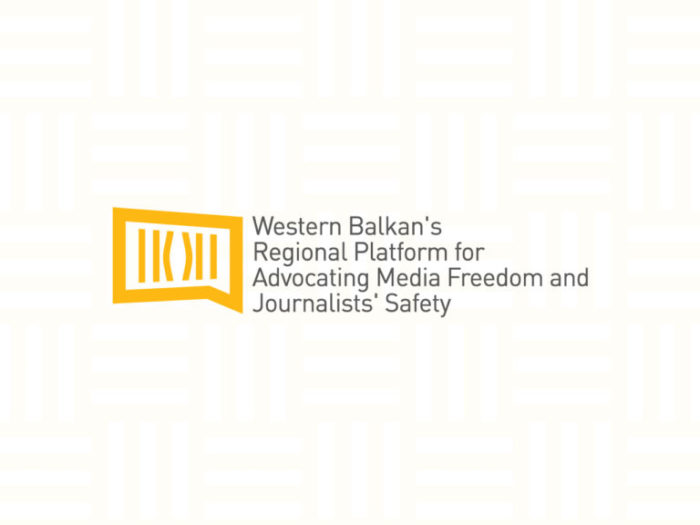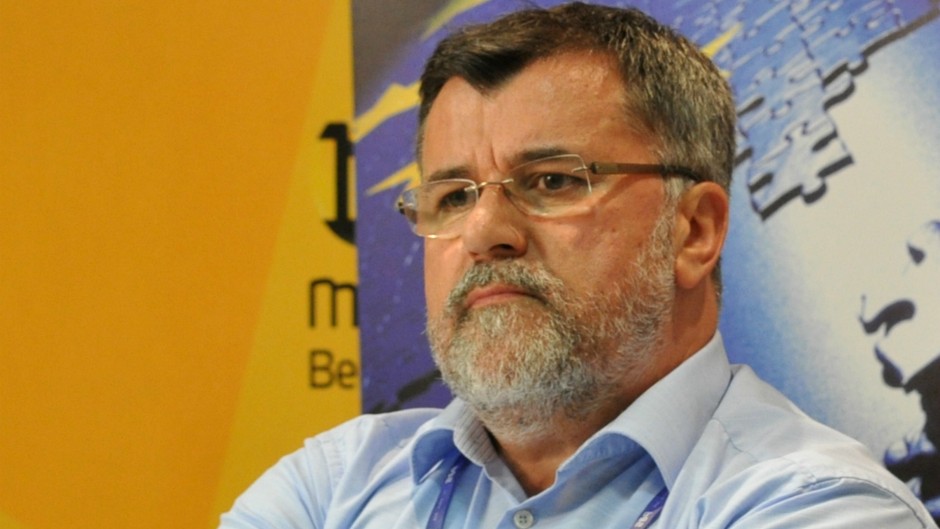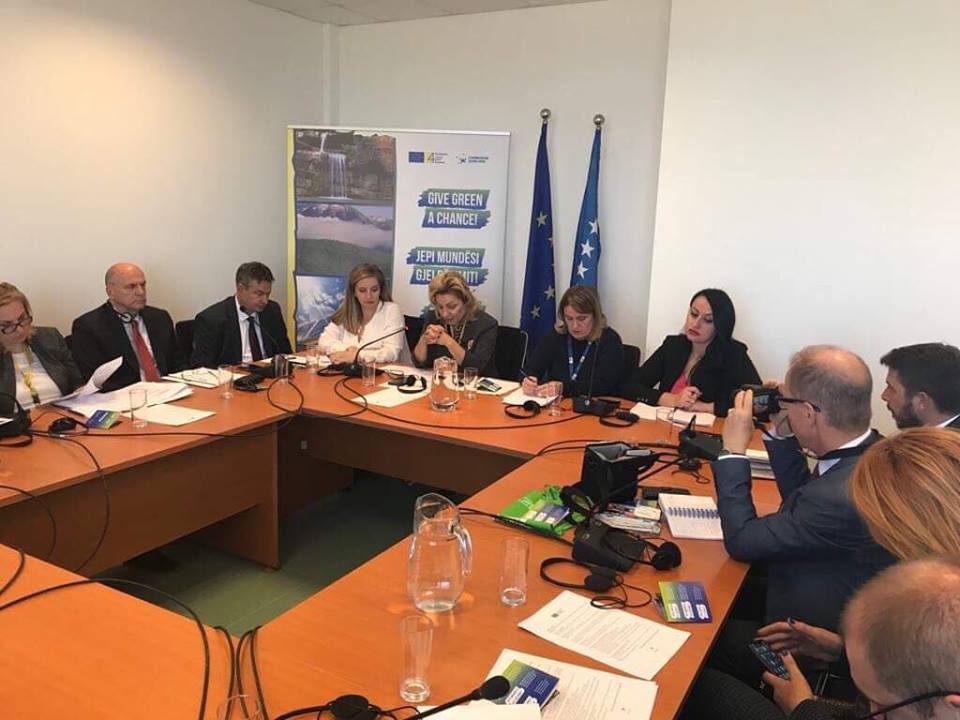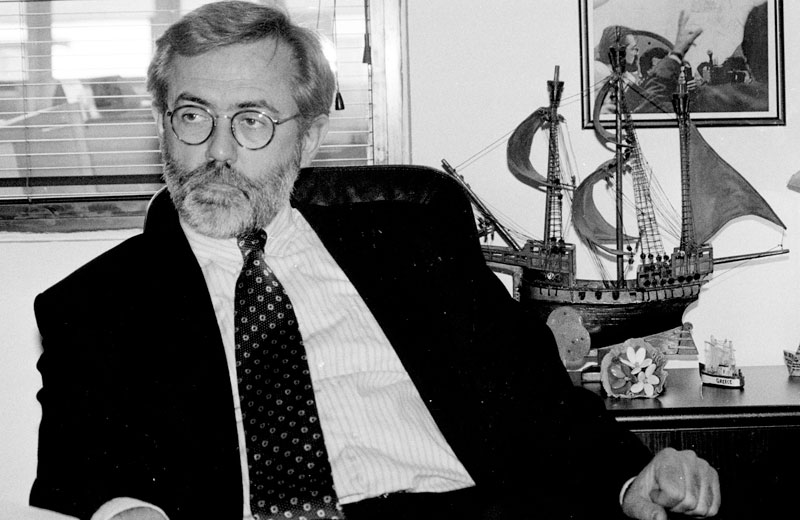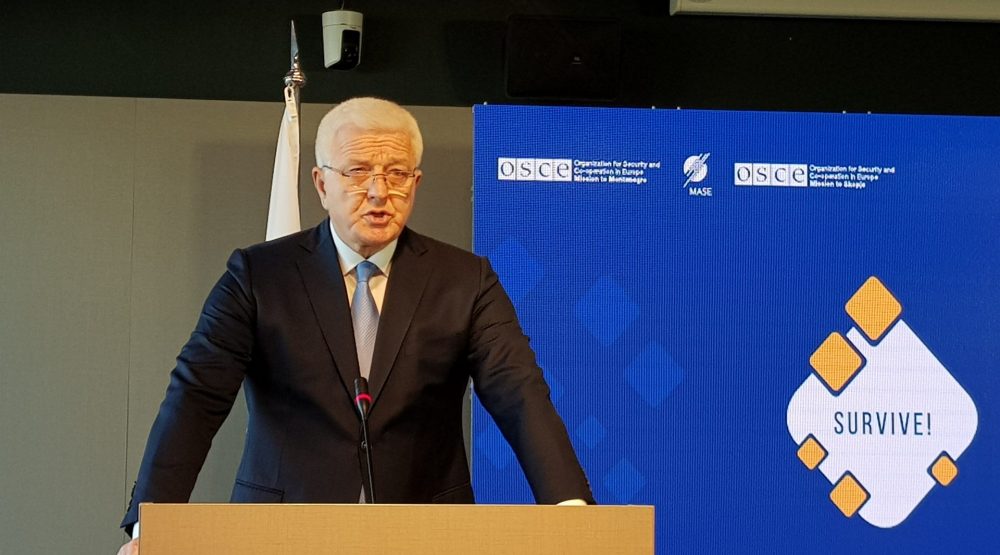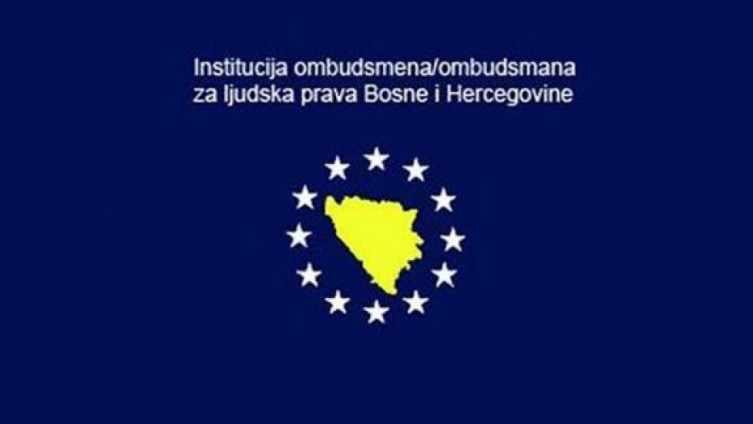BELGRADE, 11.10.2018. – President of the Commission Investigating Murders of Journalists and member of the Permanent Working Group on Journalist Safety Veran Matic told B92.net that he will propose carrying out security assessments for our prominent investigative journalists.
He stressed that this would be necessary to do preventive work in relation to possible threats to security and endangering of the lives of journalists.
Matic also talked about the cases of murders of journalists around the world, as well as about the uninvestigated murders of domestic media workers.
Our interlocutor also talked about the safety of journalists at the conference “Days of Judges of Serbia” held in Vrnjacka Banja, on the topic “The presumption of innocence and commenting on court rulings in the media.” He points out that he has used the opportunity to present data on impunity in cases of murders of journalists in Serbia, impunity when it comes to attempted assassinations and physical violence against journalists.
“I have warned also that judicial practice can be preventive and discouraging when it comes to violence and threats made against journalists. Since the law treats journalists as persons dealing with work of special importance, it would be normal for these cases and all those who can be associated with them (media satanization of journalists, editors, media …) to have judgment in the upper threatened zone, and not – as is most often the case – to impose penalties on the lower level.
“I reminded of the data on the wave of murders of investigative journalists who deal with international corruption and that we have a series of journalists dealing with similar investigations and who are experiencing threats, breaking into their flats, etc… and that a number of such cases have not been processed. At the first next session of the Permanent Working Group on Journalist Safety, I will suggest that security assessments be made for our prominent investigative journalists, in order to take preventive action in relation to possible threats to security and endangering the lives of our colleagues,” said Matic.
In the previous period, Matic was the target of criticism of the Serbian Judges Association and the High Judicial Council, in connection with his comments made on the decisions made by panels of judges.
“I have taken the opportunity to express my views on this topic at this important gathering. Without the media, there is no exercise of the control of the judiciary by the public. The public must control both those who control the system on the inside, that is, the courts of the higher instance and the Judicial Council, and, accordingly, the media must – not only need to, but must – publish and comment on the judgments and thus point to decisions of courts which are nonsense and which go against common sense, where the court takes into account half of the witness’s statement, and not the other, etc.,” he said, adding:
“My criticism of the court decision in the case of the trial of the suspects for the murder of Slavko Curuvija came after two decisions of the Appellate Court that annulled the Trial Chamber’s decisions. My criticism followed after two court decisions that were an argument to me. I am glad that the judges who spoke at this meeting also confirmed that there was no pressure on the court here, and that it is not forbidden to criticize court decisions.”
After Matic’s interview with Cenzolovka, the Bar Association led by lawyer Jugoslav Tintor suggested criminalizing any violation of the presumption of innocence with imprisonment of up to three years.
“It is not contentious that everyone has the right to the presumption of innocence, but threatening with a criminal offense of violating this presumption would lead to the suppression of public debate on issues of public interest, debates on the efficiency of the judiciary, impunity for certain types of criminal offenses (e.g. those committed against journalists) and for certain perpetrators (e.g. those close to the authorities or certain services),” Matic said.”
“Since the space for a public debate on issues of general interest is otherwise essentially narrow, the debate is otherwise missing and without it a democratic society does not exist, any new measures that could further narrow the space for this debate is more than dangerous. Regarding the presumption of innocence, the media should report neutrally, without publishing full names of the accused in all cases where there is no disturbance of the public by the commission of the offense, such as when a perpetrator in a Vojvodina town shot dead half a café because his ex sat there with her new boyfriend. But journalists cannot be criticized and convicted for information publicly disclosed by representatives of the MUP and other institutions in which the presumption of innocence is made. The proposal of lawyer Tintor has been criticized by all participants in this panel,” stressed Matic.
According to him, the panel determined that the communication which should help journalists and the media understand the court decisions, court practices better has almost died down, and vice versa, for the media present media problems and trends.
“On both sides, there have been suggestions on establishing regular communication at all levels, in order to reduce the amount of misunderstanding, wrong interpretations, etc.”, Matic explained.
The world’s public has shaken the case of the missing journalist Jamal Khashoggi, while Matic comments that the state of media freedom has been worsening continuously since the arrival to the throne of Mohammad bin Salman in Saudi Arabia.
“The Committee to Protect of Journalists (CPJ) from New York has documented the ever-increasing number of bloggers and journalists detained in unknown locations without charge. Apparently, the unauthorized detention of Khashoggi means that this practice of the Saudi authorities moves beyond the borders of the country. Several sources have reported that this columnist of th Washington Post has been killed, which, if true, would have to produce a strong international action against the authorities of this country. Of course, I think that there should already be a much stronger international response, especially the United States. But the friendly relations between the two countries seem to be some kind of obstacle to solving this case more efficiently,” says Matic.
The brutal murder of Bulgarian journalist Viktoria Marinova was initially described as “a case that has nothing to do with her work.”
“Even today, we can hear that representatives of the authorities point out that there is still no evidence that this is a murder related to her work… There is no reason for government officials to behave in this way, trying to relativize the fact that the journalist was on the task, which can also be defined as highly risky. I think that the investigation should start from precisely from there, that the messages of the authorities should respect the fact that our colleague Marinova was dealing with the work of special importance, and that her murder was one in a series of murders and violence against investigative journalists in Europe who were dealing with the same or similar issues of high international corruption.”
Last year she Kim Wall, a Swedish journalist, was brutally murdered with her head cut off… This is a very worrying trend, which requires a much more intensive and widespread reaction from European institutions, as these journalists deal with issues of exceptional importance for the functioning of the European Union. I believe that in addition to international assistance in investigations, a project of prevention should be launched regarding the working conditions and safety of journalists, and if necessary, to create new and innovative more effective institutions, because the growth of threats to journalist safety, the impunity, seriously undermine the possibility of strengthening the rule of law and democracy,” he said, adding:
“To be absolutely clear, I think that these killings must have an international dimension in the investigation, that they must have not only international observers, but also international investigators, because it often happens that investigations are conducted by those who might be the ones who gave the order… or those who are close to those who did. At this point, we only have international organizations that send protests after the murders take place, keep records of murders and violence, but we don’t have preventive institutions, which will warn on the basis of numerous indicators that violence is possible in a country and in a specific case, for concrete reasons… Such messages from credible institutions would obligate countries to take care and carry out preventive activities toward potential victims. And that each country receives adequate international assistance for the prevention, as well as for dealing with impunity.”
Recently, several eminent Turkish journalists have been sentenced to life imprisonment for allegedly participating in the alleged coup attempt in Turkey.
“Turkey is one of the biggest ‘black holes’ in terms of journalist safety, with the largest number of journalists in prisons and under investigation. And when it comes to this country, no action of solidarity, pressure from the international level has brought any success. It is obvious that more and more authoritarian societies are becoming increasingly established, which, using their position in international relations, economy, etc., avoid more significant sanctions, even in such situations of mass persecution and the locking up of journalists,” says Matic.
According to him, it is very important to recalled the horrific event of October 16, 2017, when investigative journalist Daphne Caruana Galizia was killed in the middle of the day, with a bomb placed under her car in front of her house in Malta.
“Daphne has investigated and revealed cases of corruption at the highest levels of government. So far, three people hitmen have been arrested for the murderer, but there are still no clues on who hired them and why, and it is not clear if enough has been done to find out more. Although from then on, the European Parliament, the Council of Europe, the European Commission and the Daphne Project, an international group of investigative journalists who took over her work, confirmed that Daphne had warned much before the murder that: the rule of law in the smallest European Union member state had been compromised.”
Since then, two other journalists have been killed in the European Union: Jan Kuciak from Slovakia and Viktoria Marinova from Bulgaria. All three worked on corruption cases within their own countries. All three cares about the defense of democracy and the rule of law. All three died because they could not be otherwise silenced. We definitely need to join (in Belgrade) the action of the European Federation of Journalists who will organize a vigil in Brussels, the lighting candles with a message: As citizens, we must remember them and pay tribute to them. Let’s quietly remember them with silence, remember precisely those whose voice could not be silenced and show the world that neither Daphne nor Jan nor Viktoria died in vain, he said.
“And I will remind you how important prevention is, the reaction in the threat phase. Daphne Galizia’s son described the state ahead of the liquidation in one speech: ‘The death threats that our mother received as well as an arson attempt in our house went unpunished. The lawsuits against her are still in force. The last time she left home, she headed for the bank. She wanted to access her account; which was frozen by the Minister of Economy of Malta. She hardly managed to get out of our yard, and she died without access to her own money, while the minister remains in the cabinet, and we, as her successors, continue to fight with him in court, to release and unblock those funds’,” Matic said.
Matic said that he warned on behalf of the Commission Investigating Murders of Journalists in Serbia that the trial for the murder of Slavko Curuvija was conducted with the intention to expel one of the most important pieces of evidence, and end it early with acquittals.
“Fortunately, two decisions of the Appellate Court prevented this material from being eliminated from the evidence-making process. Only now, after witnessing one of the signatories of the report on the analysis of the mutual communications of the suspects in the Slavko Curuvija case, we can understand the significance of all the evidence and facts, that their performance and conscientious evaluation can bring us closer to understanding the circumstances that preceded the murder.”
“We think that only now the testimony of Dragan Kecman (he is on the list of proposed witnesses both of the Prosecution and the Defense) would give the right picture and answers to many questions, from obstruction to the problems he encountered during the investigation and after the criminal complaint had been filed. We consider it extremely important to thoroughly checked all the defense claims that the data stored on the DLT tapes has been forged, and that the data is maliciously and in a targeted way arranged to blame the suspectsin this case, and remove any suspicion of what actually happened. The execution of all evidence in the court proceedings and the testimony of all witnesses, especially those who participated in the investigation and expertise, will give us a clear picture of the motives for the murder of our colleague Slavko Curuvija,” said Matic.
On the 9 of October, 27 years have passed since the murder of the team of Sabac’s RTS correspodents team, which, like as maby other cases, continues without a judicial epilogue.
“Our Commission for Investigating Journalist Murders has been given the mandate to deal with cases of murdered journalists on the territory of the former Yugoslavia. I hope that this case with colleagues from the Croatian Journalists Society will be processed, information collected. As with the case of the missing colleague Simp Kljajic from Gospic… In Kosovo and Metohija we have five missing Serbian journalists, two killed and seven killed Albanian journalists. We try to gather in one place everything that our institutions, the police, the BIA, the prosecutor’s offices have in order to continue working on these cases, and when conditions are created to include the provisional institutions in Kosovo.”
According to the CPJ data on the Impunity Index for the Murder of Journalists, worldwide only 4 percent of cases have been punished for the murder of journalists. Regarding the region, for the time being, so far only the Commission Investigating Murders of Journalist has established a permanent investigation process in unresolved cases, which had led to the trial for the murder of Slavko Curuvija. The investigation of the murder of Milan Pantic is ongoing and is very active…
There are now bases for some progress regarding the disappearances and murders of journalists in Kosovo and Metohija, but unfortunately, there are no similar institutional efforts in the region. I believe that our case will be used by others, and that with the cooperation between the commissions we will help to achieve better results when it comes to countering impunity for crimes against journalists.
“For a long time, when it comes to journalists’ killings, the main reason is not war, but politics, as more journalists have bee killed while reporting about corruption and politics in their countries than reporting from the battlefield. This is today the most dangerous area for reporting, since two-thirds of the murders were carried out with motives related to internal politics and corruption. Journalists dealing with these topics, constantly with the reporst, and press reports set off alarms that should prevent drastic results, cruel executions of journalists, violence, threats .. And if asociety does not respond to these alarms, it appears in advance as an accomplice. And when the worst happens, the accomplice cannot be a credible and honest investigator. Therefore, any warning from the media sphere should not be perceived by any journalist as another attack on the state, or as exhibitionism, but the warning that should be most seriously understood, thoroughly checked and preventively reacted to,” Matic concluded.


